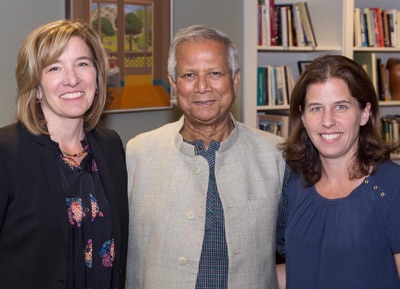Among the greatest challenges facing the Golden State is that one in five Californians live in poverty. Students at UC Santa Cruz are focused on the problem, gaining hands-on experience in community-engaged research and scholarship with an eye toward alleviating poverty and promoting economic justice.
Each year, undergraduate and graduate student scholars of the Blum Center on Poverty, Social Enterprise, and Participatory Governance take a deep dive into a wide range of issues related to fiscal equity, affordable housing, and food insecurity as they build the skills they will need to help build a more equitable society.
"Poverty is a multifaceted problem that requires multidimensional solutions," said Heather Bullock, a professor of psychology and the director of the UC Santa Cruz Blum Center. "We are training the next generation of scholars and advocates in the ongoing war on poverty."
The UC Santa Cruz Blum Center was established in 2014 with seed funding from UC Regent Richard Blum. Each campus in the UC system hosts a Blum Center with their own unique focus; all are united by a commitment to alleviating poverty and giving students opportunities to "learn by doing."
"Poverty and economic inequality are among the most pressing problems facing this country, and this county," said Bullock. "At UCSC’s Blum Center, we believe poverty is rooted in broken systems, not broken people, and when universities and communities work together, we make progress."
The center's initiatives recently received a major boost in the form of a $500,000 gift to deepen and expand the center's reach. The gift establishes an endowment to ramp up student opportunities for anti-poverty innovation and action. Planned activities include the creation of a new micro-lending program for low-income students and an initiative to bolster food security among students. The funds will also be used to provide students with the policy analysis, research, and communication skills needed to effect change.
"Many of our students are coping with the same challenges they are studying in the community," said Bullock. "This gift will be transformational in so many ways. We are very excited about the new opportunities it will open up."
Blum Center scholars work with faculty mentors and get hands-on learning opportunities with local, regional, statewide, and international nonprofits and organizations. The small grants associated with the program provide students with the tools, resources, and opportunities to develop and test anti-poverty innovations.
The breadth and scope of Blum scholar projects is impressive, with topics ranging from the needs of homeless veterans in Santa Cruz, housing insecurity among Latinx communities in Los Angeles, labor rights in the Philippines, and the role of faith-based humanitarian action in Bolivia. Last June, Jessica Chuidian-Ingersoll began a six-month field study with Tenants Together, a statewide tenants' rights organization that is advocating on behalf of the state's 16 million renters.
On campus, Blum Scholars are studying the impacts of poverty among students, and undergraduate Evelyn Drake teamed up with the Disability Resource Center (DRC) on a research project focusing on the experiences of students who seek support from the DRC.
In Santa Cruz, the Blum Center is partnering with Santa Cruz Community Ventures, a local nonprofit that focuses on building families’ financial capabilities. Predatory lending practices are a significant concern across California, said Bullock.
"Watsonville is one of the poorest areas in the county," she said. "Many families don't have bank accounts and even if when they do, they may not have access to the kinds of services that they need, which makes it challenging to cash paychecks, get a loan, build credit, and make car and other payments. "As a result, low-income families may turn to so-called "alternative banking services" to cash checks and pay their bills.
"This is an area where we can make a difference,” said Bullock. "By assessing community financial needs and resources, we can provide elected representatives and policy makers with the data and analyses they need to support individuals and families."
The Blum Center is also working with the Santa Cruz Community Action Board.
"They invited us to help them collect and analyze data that will inform a new county-wide strategic plan for addressing poverty," said Bullock.
Last winter, a team of talented, bilingual, bicultural undergraduate and graduate students received training in research skills—confidentiality, listening with dignity, taking notes, and coding discussions—before attending a series of "listening circles" with members of largely overlooked groups that included undocumented youth, day workers, and others. Their findings will become part of a countywide strategic plan on poverty.
"This collaboration illustrates perfectly what we do," said Bullock. "We support the community, work in partnership, and train students to do cutting-edge, research designed to reduce poverty and inequality."



